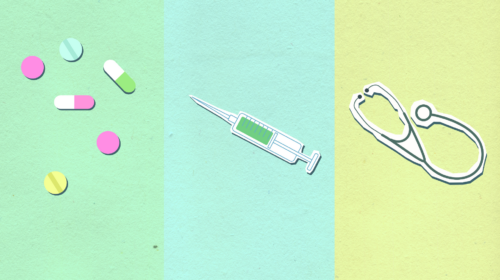Demerol is a powerful and highly addictive narcotic painkiller that often goes by its generic name meperidine. Although less known than other types of prescription and synthetic opioids, such as oxycodone, hydrocodone, or fentanyl, Demerol has a high potential for diversion, misuse, and subsequent dependency. The Substance Abuse and Mental Health Services Administration (SAMHSA) estimates that a significant number of people misuse Demerol every year and that, while less reported than other types of opioids, it is a heavy contributor to the uptick in overall opioid fatalities driven by prescription varieties. The National Institute on Drug Abuse reports that 46,802 Americans died from opioid overdose in 2018, 14,975 of which were attributable to prescriptions.
Demerol Dos and Don’ts: What Is Meperidine Used For?
Demerol should only be used in the short-term treatment of moderate to severe pain. The drug should be integrated into the patient’s severe-pan treatments only when other types of pain relievers don’t work or can’t be tolerated. This means that if you take other medications like over-the-counter or prescription-strength ibuprofen or acetaminophen and they don’t relieve the pain, Demerol or meperidine therapy may be warranted. Demerol should only be used in short-term applications (a few weeks to a month at a time) under the supervision of a qualified prescribing physician. Taking Demerol for longer than is advised can lead to withdrawal and subsequent physical and psychological dependency.
How Is Demerol Administered?
Demerol is prescribed in tablet, liquid, or injectable form. Injections are performed either independently or by the prescribing physician into a vein, into a muscle, or under the skin. If you are giving this medication to yourself at home, learn all preparation and usage instructions from your healthcare professional. The potency of Demerol and the speed with which it acts depends on how it is administered. Injections tend to deliver the most immediate and potent relief. The Food and Drug Administration reports that the prolonged use of Demerol and other types of meperidine can increase the risk of toxicity and overdose.
Can I Become Addicted?
Like all other types of opioid painkillers, Demerol can be highly addictive. The likelihood of Demerol addiction increases that longer non-essential use persists. The drug creates serious and lasting changes in the brain’s chemistry and central nervous system. Some of the immediate signs of Demerol addiction include, but are not limited to:
- Taking More of the Drug than Prescribed
- Watching the Clock Between Doses
- Illegal Acquisition
- High-Risk Behavior in Pursuit of the Drug
Demerol abuse can occur in various forms, including but not limited to, taking more than prescribed, using it in ways not intended (such as crushing, chewing, snorting, or injecting the dissolved product), or using it without a prescription. These practices will result in the uncontrolled delivery of the opioid and pose a significant risk to the abuser that could result in overdose or death.
Immediate and Long-Term Dangers of Meperidine Abuse
Demerol abuse comes with a variety of immediate and long-term health risks, such as:
- Physical and Psychological Dependence
- Anxiety and Depression
- HIV, Hepatitis, and other Infectious Diseases (from Needle Exchange)
- Potentially Fatal Respiratory Depression
- Chronic Withdrawal
Withdrawal symptoms of meperidine abuse can include irritability and restlessness, involuntary leg movement, extreme changes in body temperature, stomach illness, joint and muscle pain, fever and flu-like symptoms, extreme cravings, and more. If you are experiencing these or any other symptoms related to your Demerol use, it’s critical that you get help from your prescribing doctor or seek treatment immediately for Demerol addiction.
Signs of A Demerol Overdose
Demerol overdose is a time-sensitive matter and a very real possibility for both legitimate and illegitimate users. It’s important to recognize the signs, which include no or limited breathing, indicators of cyanosis like blue lips or fingernails, fatigue, convulsion, low blood pressure, bradycardia, stomach cramps, nausea and vomiting, cold and clammy skin, drowsiness, lightheadedness, and twitching muscles. In severe overdose, patients may experience circulatory relapse, cardiac arrest, apnea, and, in some cases, death. If you feel your loved one is experiencing a Demerol overdose, it’s critical that you call 911 to get immediate help. Once they’re stable, alert, and able to breathe on their own, start exploring treatment options for addiction.
Treating Demerol Abuse and Addiction
If you’re struggling with addiction to Demerol, the first thing to realize is that you shouldn’t beat yourself up. Millions of people start taking opioids for legitimate pain and end up addicted—you’re not alone. You do, however, need treatment. Treatment should include detox for immediate medical issues followed by possible behavioral rehab. This process is especially important for people who with a prolonged history of Demerol abuse. Whether your Demerol addiction started on the street or at the doctor’s office, you don’t have to sacrifice your life to Demerol addiction.
Maybe you don’t think your problem is that bad or that you’re in control even though you’re broke, addicted, and in constant legal trouble. The longer you maintain this line of thinking, the more Demerol abuse will destroy your health and quality of life. Recovery begins where denial ends. Get help now.

























